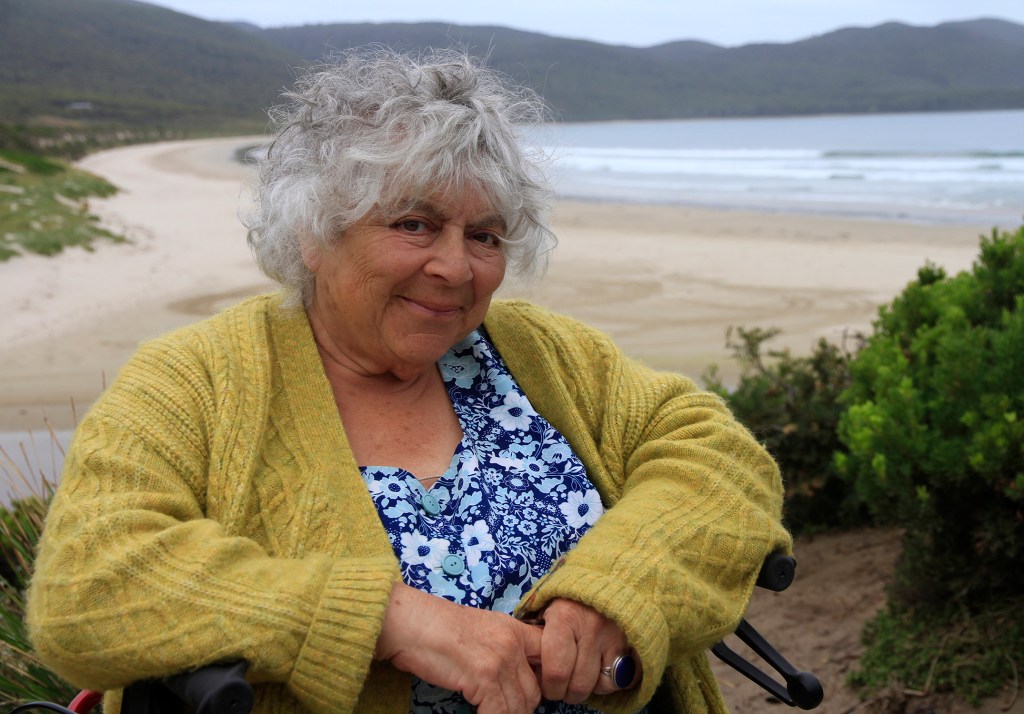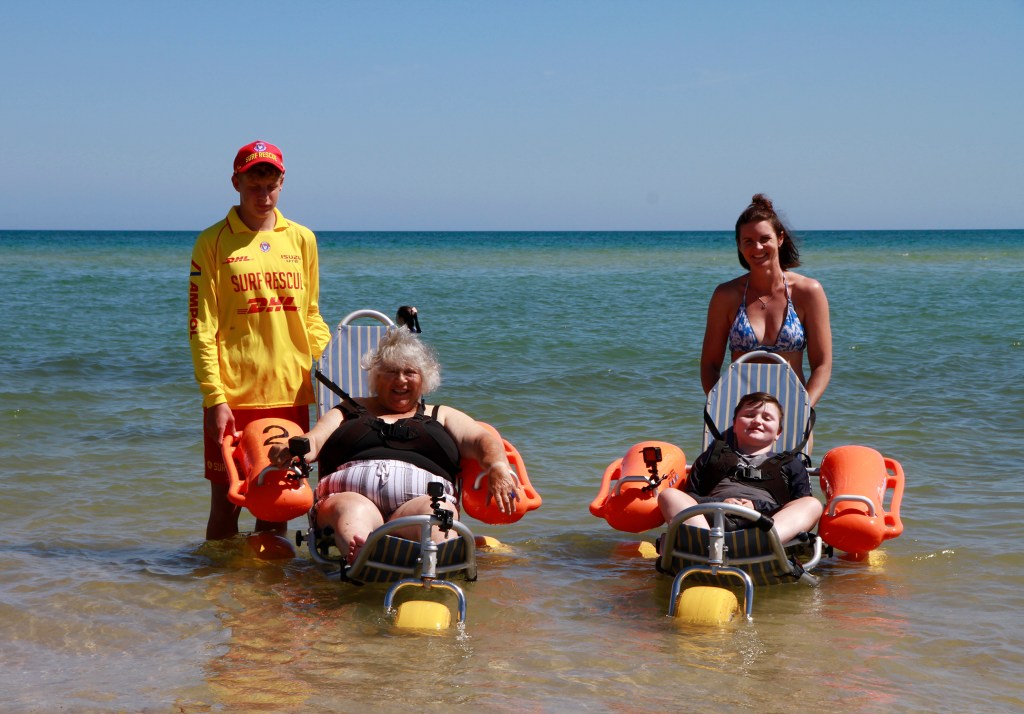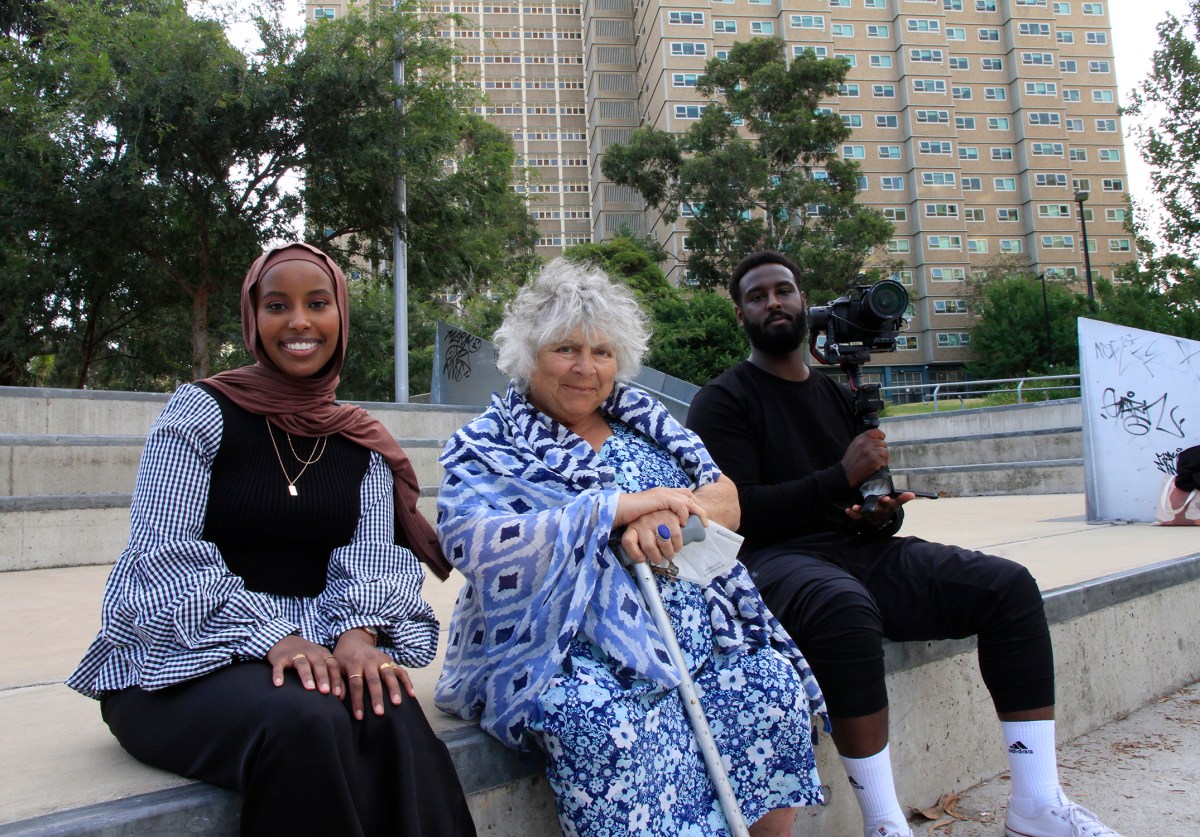What has made actor Miriam Margolyes such a beloved talk-show raconteur is her ability to take a situation as she finds it. And in her new three-part travelogue documentary series for the ABC, Australia Unmasked, she takes a similar approach as in 2020’s award-winning docuseries Almost Australian. Margolyes is a naturalised Australian citizen, but she maintains an outsider’s curiosity about her adopted country.
While this series is themed around Margolyes’ quest to discover the current health of the Australian ‘fair go’, the title doesn’t really make this clear. Instead it seems like a vague gesture to the social changes of the Covid era.
‘I’m worried the pandemic has left us isolated and divided,’ she says in voiceover; and she’s shown packing copious RAT tests and N95 face masks into her campervan. As an 80-year-old with various underlying health conditions, Margolyes can’t afford to catch a disease that’s still rampant, and deadlier than ever.
‘You look like a twat, but it can’t be helped,’ she says in trademark fashion.
Heading south
While in the earlier series Margolyes travelled north from her adopted home in the NSW Southern Highlands, this one finds her travelling south, then west. In Episode 1 she visits Tasmania to trace how the ideology of the ‘fair go’ arose alongside European colonisation. Episode 2 sees her reach Victoria, where she investigates issues of class. And in South Australia in Episode 3, she examines whether Australians made vulnerable by old age and disability are being left behind.

Strikingly, Margolyes allows her own frailty to be a focus of the series. She’s always had an earthy, impudent physical presence; but here she uses a mobility scooter and a walking stick, plus a stack of books as a makeshift footstool to help her in and out of hotel and motel beds. Some of her ruminations on what she’s discovered on her trip are delivered in such beds, in her nightie; and in episode three, particularly, she muses that it’s been hard for her to think of herself, at last, as old and vulnerable.
As I watched, I found myself pondering how much background research and planning went into the series; but it’s a testament to its host’s rapport with everyone she meets that so much of what happens onscreen seems spontaneous and serendipitous. Her crew never appear on-camera, giving the impression that Margolyes is a completely independent traveller.
While she has some specific stops on her itinerary, at other times she seems to just run into people on the street, who then invite her to hang out with them. The approach works because Margolyes, like a good improv actor, always says yes to everything in good humour.
Unease with the rich
However, there’s always a noticeable friction whenever she bumps up against privileged people – whether they be Tasmanian hereditary landowners and beneficiaries of assigned convict labour, earnest Xavier College prefects in Melbourne, or the sleek polo set in Victoria’s Western District.
‘I don’t feel easy with rich people; that’s the truth,’ Margolyes says. ‘I liked them as people but I felt they were a cut above me.’
The rich Australians Margolyes meets invariably downplay the nature of their privilege. They are always perfectly lovely and welcoming, and take pains to mention that anyone can go to the polo, it’s not even important who’s at an elite private school on a scholarship, and Australia can ‘give opportunities to people who are prepared to do the hard yards’.
‘I’m not sure how well that translates in reality,’ Margolyes says slyly, seeing through them instantly. ‘Class is about much more than wealth: it’s about access and culture and influence.’
Some casual moments in the documentary have really stuck with me. A beggar in his 70s whom Margolyes meets on the streets of Melbourne calls himself middle-class: he tells her he went to Melbourne Grammar School and Monash University, but ‘worked too hard and had a breakdown’.
Fair go
I was also struck by Hamdi, the Somalian-born Uber driver who who’s also a community organiser in the Carlton Housing Commission tower flats. He says he has a comfortable, middle-class life, and for him, the ‘fair go’ is the possibility that his kids will grow up to nurture the same kinds of ambitions as the Xavier schoolboys Margolyes has just met.
But it was also heartbreaking to see Israel, an Aboriginal prisoner and Stolen Generations member who’s finding new purpose by training greyhounds, blame his own bad choices for his lifetime in the correctional system, when his choices have clearly been shaped and directed by racist systems.
And I was profoundly moved by Janette and Michael, two adults in Beaconsfield who are among the 50% of functionally illiterate Tasmanians. They tear up as they talk about growing up between foster homes, discouraged by primary-school teachers who said they’d never amount to anything.
‘The thing about a fair go is: who gives it to you?’ Margolyes asks. ‘Or do you bloody well take it? Do you insist on having it?’
Some of the puzzle pieces she unearths on her journey correspond in subtle ways the documentary doesn’t explicitly identify. When Margolyes meets a lovely foster mum in Victoria who sets out to give children the love they’ve missed out on, I couldn’t help remembering those former foster kids in Tasmania.

And Israel’s disconnection from his culture contrasts with the quiet pride of the palawa people who teach Margolyes about the Cape Grim massacre: activist Michael Mansell’s confident children and grandchildren are testament to the love and knowledge he’s poured into them.
There’s a similar confidence in Zaynab, a young poet of Somalian heritage whom Margolyes encounters outside the Carlton Housing Commission towers, being filmed by her videographer friend Khalid. They’re educated, articulate, and keen to use their skills not to assimilate into ideas of Australian respectability, but to call out everyday racism.
‘Respect as a human being: maybe for her that’s what a fair go is about,’ Margolyes muses.
Support networks
But what she discovers, again and again, is that having the support and care of others is what really helps Australians to thrive. When she meets some petrolhead hoons who take her to do burnouts in their souped-up Commodores outside Bendigo, her ostensible class-based discussion of ‘bogans’ is really a smokescreen for community: the ‘hoon’ turns out to be an Autistic man whose family and friends are supporting him to do what he loves.
In South Australia, where she meets 10-year-old Duchenne muscular dystrophy sufferer Tyler and his mum Amanda, Margolyes is struck by the fact that it’s Amanda’s advocacy for her son that will really make Tyler’s life joyful and worthwhile. The awful thing about being disadvantaged in Australia – as Margolyes’ own frailty underscores – is that you might fall between the cracks in the system, with nobody to notice, let alone pull you to safety.
Miriam Margolyes: Australia Unmasked
Presenter: Miriam Margolyes
Series Producer: Bethan Arwel-Lewis
Executive Producers: Laurie Critchley, Leo Faber
Director: Helen Barrow
Miriam Margolyes: Australia Unmasked premieres on ABC1 on Tuesday 19 July at 8:30pm; all episodes are streaming on ABC iview
Actors:
Director:
Format: Movie
Country:
Release:





